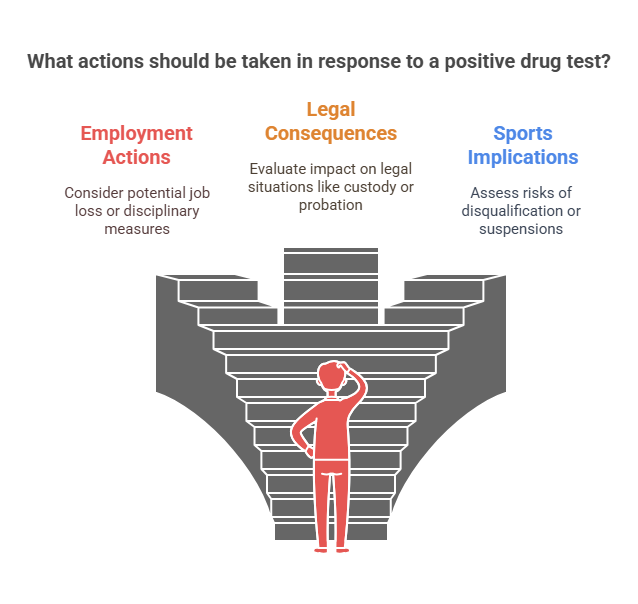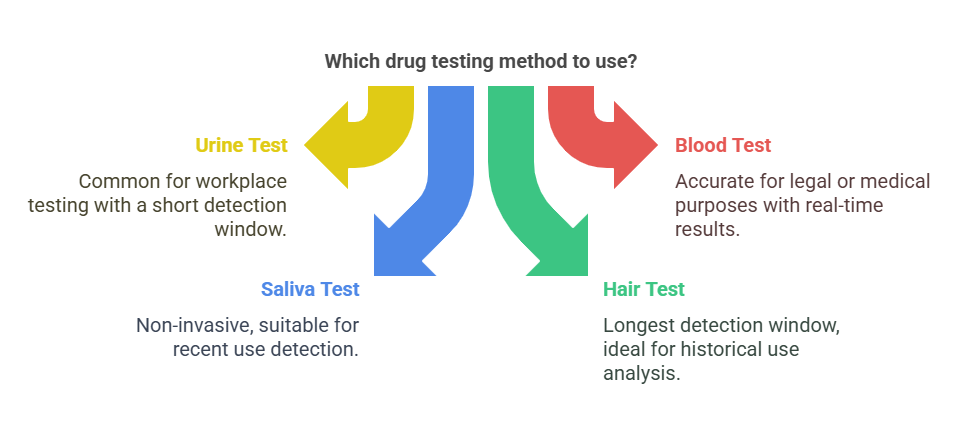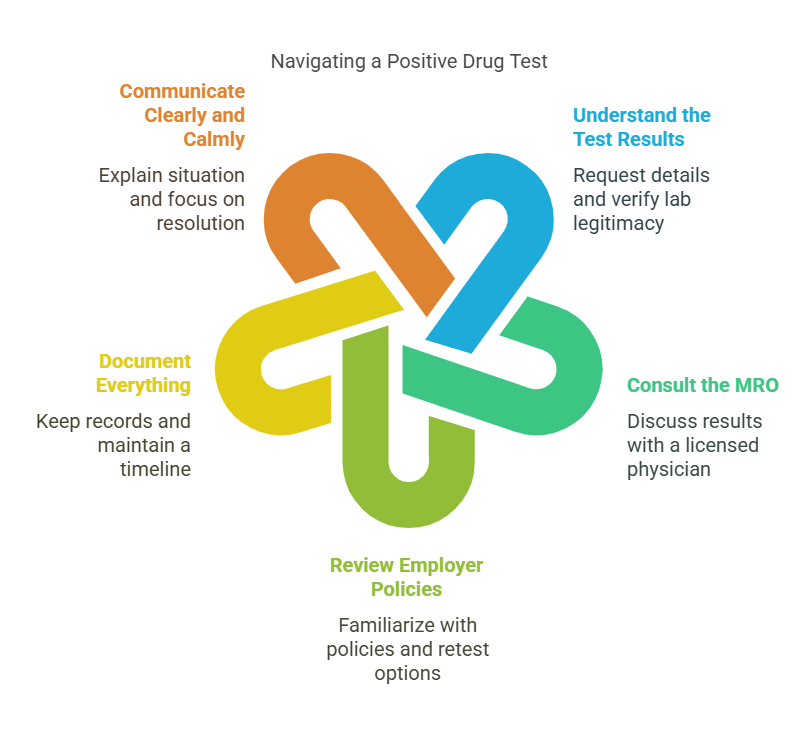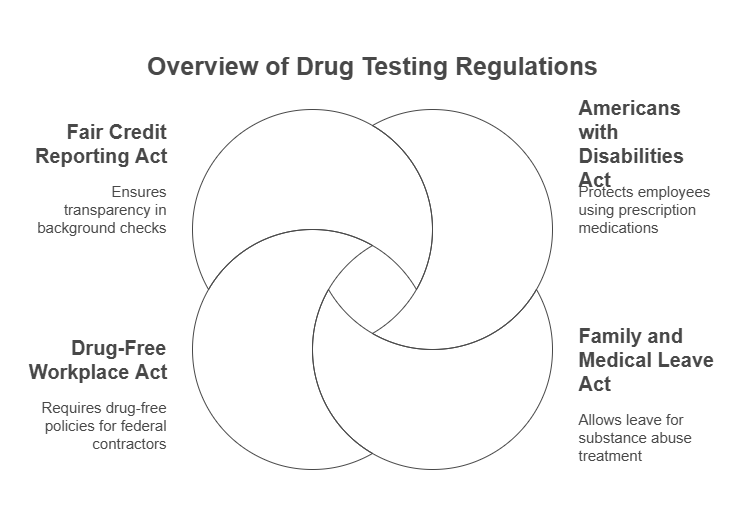Steps to Take After a Positive Drug Test Result

Understanding Positive Drug Tests
A positive drug test can have significant implications for individuals in various contexts, including employment, legal matters, and sports. To understand its full impact, it’s crucial to know what a positive drug test means, the testing methods used, and the common reasons that lead to positive results.
What Does a Positive Drug Test Mean?

A positive drug test indicates the detection of specific substances or their metabolites in a person’s system that exceed the established threshold levels. These substances may include illegal drugs, prescription medications, or even certain over-the-counter drugs.
Implications of a Positive Drug Test:
- Employment: A positive result may lead to disciplinary action, loss of job offers, or termination.
- Legal Consequences: Positive drug tests are often used in court cases, such as custody battles or probation violations.
- Sports: Athletes testing positive may face disqualification, suspensions, or fines.
It’s important to note that a positive test doesn’t always mean illegal drug use. Other factors, such as prescription medications or testing errors, can also contribute to the result.
Types of Drug Tests and How They Work

Drug tests can analyze various biological samples to detect substances or their metabolites. The choice of test often depends on the context, such as workplace screening, forensic investigations, or medical purposes.
1. Urine Drug Tests
- Most Common: Widely used in workplace testing.
- Detection Window: 1–7 days for most substances.
- How It Works: Detects metabolites, which are byproducts of drugs processed by the body.
2. Blood Drug Tests
- Highly Accurate: Used for legal or medical purposes.
- Detection Window: A few hours to 2 days.
- How It Works: Identifies the parent drug in the bloodstream, offering real-time results.
3. Saliva Drug Tests
- Non-Invasive: Increasingly used for workplace and roadside testing.
- Detection Window: 1–3 days, depending on the substance.
- How It Works: Detects drugs in oral fluids, reflecting recent use.
4. Hair Drug Tests
- Longest Detection Window: Can detect drug use over 90 days.
- How It Works: Analyzes drug metabolites embedded in hair follicles.
Common Reasons for a Positive Drug Test
Positive drug tests may result from various causes, some of which are legitimate and others problematic. Below is a breakdown of common reasons for positive results:
1. Illegal Drug Use
- Examples: Cocaine, marijuana, methamphetamine, heroin.
- Context: Often results in disciplinary or legal action.
2. Prescription Medications
- Examples: Opiates, benzodiazepines, amphetamines.
- Why They Trigger Positives: Prescription medications can share chemical similarities with substances flagged in drug panels.
3. Over-the-Counter Medications
- Examples: Pseudoephedrine (cold medicine), ibuprofen, antihistamines.
- Impact: These can sometimes result in false positives due to chemical composition.
4. Cross-Contamination or Mislabeling
- How It Happens: Errors in handling samples or contamination at the laboratory.
5. Dietary Supplements
- Examples: Products containing unregulated substances like kratom or CBD.
- Risk: Many supplements lack FDA regulation, increasing the chance of positive results.
Table: Substances That Commonly Cause Positive Results
| Category | Example Substances | Reason for Positive Result |
|---|---|---|
| Illegal Drugs | Cocaine, marijuana, heroin | Direct detection of illicit drug use |
| Prescription Medications | Oxycodone, Adderall, Valium | Legitimate use for medical treatment |
| Over-the-Counter Drugs | Pseudoephedrine, ibuprofen | Chemical similarities to illegal substances |
| Dietary Supplements | Kratom, CBD products | Presence of unregulated or mislabeled compounds |
| Alcohol | Ethanol, methanol | Tested in specific panels for workplace or legal cases |
Why Errors Happen in Drug Testing
While drug testing is generally reliable, errors can occur due to various factors. These include:
- Sample Handling: Contamination or mislabeling during collection or transport.
- Testing Equipment: Malfunctions in laboratory instruments.
- Human Error: Mistakes during analysis or interpretation.
- Cross-Reactivity: Some substances produce similar chemical reactions, leading to false positives.
Step-by-Step Guidance for Responding to a Positive Drug Test

If you’ve received a positive drug test result, follow these steps to ensure the situation is handled fairly and accurately:
Step 1: Understand the Test Results
- Request Details: Ask your employer or testing agency for specific information about the substance detected and the testing method used.
- Verify Legitimacy: Ensure the lab conducting the test is certified by a recognized body, such as the Department of Health and Human Services (HHS) or SAMHSA (Substance Abuse and Mental Health Services Administration).
Step 2: Consult the Medical Review Officer (MRO)
- Role of the MRO: An MRO is a licensed physician trained to review drug test results and determine if there is a legitimate medical explanation for a positive result.
- Provide Documentation: Share proof of any prescriptions, medical conditions, or over-the-counter medications that may have caused the positive result.
Step 3: Review Employer Policies
- Understand the Process: Familiarize yourself with your employer’s drug testing policy, including the steps for contesting a positive result.
- Request a Retest: If you suspect an error, ask for a retest using a new sample or confirmatory testing on the original sample.
Step 4: Document Everything
- Keep Records: Save copies of prescriptions, doctor’s notes, and any communication with your employer or MRO.
- Maintain a Timeline: Record dates and details of interactions related to the drug test.
Step 5: Communicate Clearly and Calmly
- Be Transparent: Explain the situation to your employer without being defensive.
- Focus on Resolution: Emphasize your willingness to cooperate and follow the necessary steps to resolve the matter.
The Role of Medical Review Officers (MROs)
MROs are crucial in the drug testing process, serving as impartial reviewers to ensure fair outcomes.
How MROs Work
- Initial Review: The MRO examines the lab results and verifies that testing protocols were followed.
- Interview with Employee: The MRO contacts the individual to discuss the test results and request documentation for any legitimate medication use.
- Final Decision: If the MRO confirms a valid medical explanation (e.g., a prescription), they report the result as negative to the employer.
Why MROs Are Important
- Protect Employee Rights: MROs prevent unjust consequences by distinguishing legitimate drug use from illegal or unsafe activity.
- Enhance Accuracy: Their expertise helps reduce errors and ensure that results are interpreted correctly.
Workplace Drug Testing Policies and Employee Rights
Employers and employees must navigate the complexities of workplace drug testing with a clear understanding of policies and legal protections.
Employer Policies
- Zero-Tolerance vs. Accommodation: Some employers enforce strict no-drug policies, while others may accommodate legitimate prescriptions.
- Testing Scenarios: Employers typically conduct drug testing for:
- Pre-employment screening.
- Random testing.
- Post-accident investigations.
- Reasonable suspicion.
Employee Rights
- Right to Contest: Employees have the right to dispute positive results by providing evidence of legitimate drug use or requesting a retest.
- Reasonable Accommodation: Under laws like the Americans with Disabilities Act (ADA), employers must accommodate employees using prescribed medications for a medical condition.
- Privacy Protections: Drug test results and related medical information must be kept confidential and shared only with authorized personnel.
How Precise Hire Supports Employers and Employees
At Precise Hire, we are committed to providing accurate, compliant, and fair employment screening services. Our approach ensures that both employers and employees can navigate drug testing with confidence.
Our Employment Screening Services
- Certified Laboratories: We partner with accredited labs to deliver reliable results.
- MRO Collaboration: Our network of qualified MROs ensures thorough reviews of test results.
- Policy Development: We help employers create clear and legally compliant drug testing policies.
Why Choose Precise Hire?
- Accuracy: We minimize errors through advanced testing technologies and strict quality controls.
- Compliance: Our services adhere to federal and state regulations, ensuring fairness and transparency.
- Support: We guide employers and employees through every step of the drug testing process.
Tips for Communicating with Employers
Open communication is key to resolving issues related to positive drug tests. Follow these tips to effectively address concerns with your employer:
Be Proactive
- Initiate the Conversation: Reach out to your employer as soon as you receive the results.
- Provide Documentation: Present evidence, such as prescriptions or doctor’s notes, to support your case.
Stay Professional
- Avoid Emotional Reactions: Approach the discussion calmly and focus on finding a resolution.
- Respect Company Policies: Acknowledge your employer’s position while advocating for your rights.
Seek Assistance if Needed
- Legal Advice: Consult an attorney if you believe your rights have been violated.
- HR Involvement: Involve your Human Resources department to ensure policies are followed correctly.
Legal Aspects of Positive Drug Tests

Drug testing is regulated by a combination of federal and state laws, as well as specific employer policies. These regulations aim to protect individuals’ rights while ensuring workplace safety and compliance.
Key Federal Laws Governing Drug Testing
- Americans with Disabilities Act (ADA)
- Protects employees and job applicants with disabilities who use prescription medications to manage medical conditions.
- Employers must provide reasonable accommodations unless it causes undue hardship or poses a safety risk.
- Family and Medical Leave Act (FMLA)
- Allows employees to take leave for medical treatment, including rehabilitation for substance abuse, without fear of losing their job.
- Drug-Free Workplace Act of 1988
- Requires federal contractors and grantees to maintain a drug-free workplace. This includes implementing drug testing policies and addressing positive test results.
- Fair Credit Reporting Act (FCRA)
- Ensures transparency in employment background checks, including drug testing. Employers must notify individuals before conducting a test and obtain written consent.
State-Specific Laws and Variations
Drug testing laws vary by state, particularly regarding:
- Medical and Recreational Marijuana Use:
- States with legal marijuana may have specific protections for employees who test positive but use cannabis outside of work hours. However, these laws often exclude safety-sensitive positions.
- Testing Requirements: Some states mandate confirmatory testing or allow individuals to challenge positive results.
- Employer Obligations: In certain states, employers must disclose their drug testing policies to employees upfront.
Legal Consequences of Failing a Drug Test
Failing a drug test can lead to:
- Termination or Job Offer Withdrawal: Employers often reserve the right to dismiss employees or revoke offers based on positive results.
- Suspension: Employees may be temporarily removed from duties, particularly in safety-sensitive roles.
- Legal Penalties: In court-ordered drug testing scenarios, positive results may result in fines, probation violations, or loss of custody.
FAQs About Drug Testing and Employment Screening
What happens if my drug test is positive but I have a prescription?
If you have a valid prescription, the Medical Review Officer (MRO) will review your test result. Once you provide documentation, such as a prescription or a note from your healthcare provider, the MRO may report the result as negative to your employer.
How long do drugs stay in your system for a drug test?
The detection window depends on the type of drug and test:
- Urine Tests: 1–7 days for most drugs, longer for chronic use.
- Blood Tests: Hours to 2 days.
- Saliva Tests: 1–3 days.
- Hair Tests: Up to 90 days.
Can over-the-counter medications cause a false positive?
Yes, some over-the-counter drugs can trigger false positives. For example:
- Pseudoephedrine (cold medicine) may mimic amphetamines.
- Ibuprofen may trigger false positives for marijuana.
Confirmatory testing can distinguish these substances from illegal drugs.
Are employers required to verify positive test results before taking action?
Yes, reputable employers typically use MROs to review results and verify legitimate medical explanations before making decisions. This step ensures accuracy and fairness.
What should I do if I suspect an error in my drug test?
If you believe there was a mistake:
- Request Retesting: Ask for a confirmatory test on the original sample or submit a new sample.
- Provide Documentation: Share relevant medical records or prescriptions.
- Consult Legal Advice: Seek help from an attorney if the error affects your employment or reputation.
What happens if my drug test is positive but I have a prescription?
If you have a valid prescription, the Medical Review Officer (MRO) will review your test result. Once you provide documentation, such as a prescription or a note from your healthcare provider, the MRO may report the result as negative to your employer.
How long do drugs stay in your system for a drug test?
The detection window depends on the type of drug and test:
- Urine Tests: 1–7 days for most drugs, longer for chronic use.
- Blood Tests: Hours to 2 days.
- Saliva Tests: 1–3 days.
- Hair Tests: Up to 90 days.
Can over-the-counter medications cause a false positive?
Yes, some over-the-counter drugs can trigger false positives. For example:
- Pseudoephedrine (cold medicine) may mimic amphetamines.
- Ibuprofen may trigger false positives for marijuana.
Confirmatory testing can distinguish these substances from illegal drugs.
Are employers required to verify positive test results before taking action?
Yes, reputable employers typically use MROs to review results and verify legitimate medical explanations before making decisions. This step ensures accuracy and fairness.
What should I do if I suspect an error in my drug test?
If you believe there was a mistake:
- Request Retesting: Ask for a confirmatory test on the original sample or submit a new sample.
- Provide Documentation: Share relevant medical records or prescriptions.
- Consult Legal Advice: Seek help from an attorney if the error affects your employment or reputation.
Conclusion
A positive drug test can have serious implications, but understanding the processes, legal protections, and rights available to you is essential for navigating the situation successfully. Here’s a summary of key takeaways:
- Understanding Positive Results: Positive results don’t always indicate illegal drug use. Prescription medications, over-the-counter drugs, and even testing errors can lead to a positive outcome.
- Steps to Take: Work with Medical Review Officers, provide documentation, and communicate clearly with your employer. Keep detailed records and stay professional.
- Legal Protections: Laws like the ADA, FMLA, and state-specific regulations safeguard the rights of employees while ensuring employers maintain compliant practices.
At Precise Hire, we are committed to helping employers and employees navigate drug testing with accuracy and compliance. Our comprehensive employment screening services include access to certified labs, collaboration with qualified MROs, and expert guidance on creating fair and transparent drug testing policies.
By choosing Precise Hire, you can ensure a professional and reliable approach to employment screening, minimizing errors and promoting trust between employers and employees.
If you need assistance with drug testing or employment screening, contact Precise Hire today. Let us help you create a safer, more compliant workplace!
